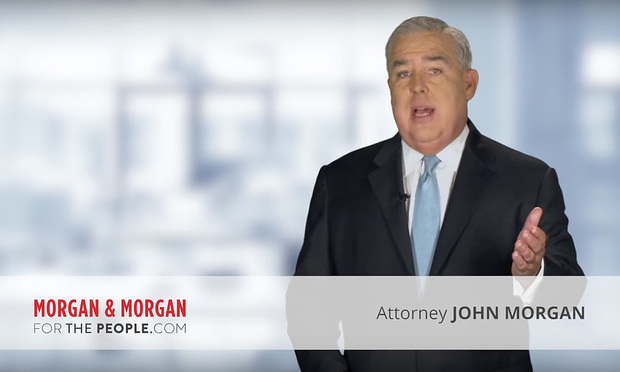10 Busiest Employment Litigation Firms in Florida, Texas, Georgia
"At the end of the day, I think legal analytics answers more strategy questions,” said Rachel Bailey, a legal data expert at Lex Machina.
August 20, 2019 at 02:54 PM
5 minute read
 Morgan & Morgan was the plaintiffs firm with the most employment cases in the region, according to the report. Photo: YouTube
Morgan & Morgan was the plaintiffs firm with the most employment cases in the region, according to the report. Photo: YouTube
Morgan & Morgan, The Buenker Law Firm, Barrett & Farahany, and Ogletree Deakins Nash Smoak & Stewart are among the busiest firms when it comes to employment litigation in Georgia, Florida and Texas, according to a new report issued Tuesday.
Most active plaintiffs firms
- Morgan & Morgan – 686 cases
- Remer & Georges-Pierre – 453 cases
- Marie A. Mattox – 388 cases
- Wenzel Fenton Cabassa – 350 cases
- Richard Celler Legal – 350 cases
Morgan & Morgan was the most active plaintiffs firm in the region, with nearly 700 cases in Georgia, Florida and Mississippi from 2016 to 2018, according to the “Employment Litigation in the Southwest Report,” by Lex Machina, a legal analytics company.
In Texas, The Buenker Law Firm had the most cases at 179.
Barrett & Farahany was busiest in Georgia with 291 cases.
Florida is home to the top five plaintiff firms: Morgan & Morgan; Remer & Georges-Pierre; Marie A. Mattox; Wenzel Fenton Cabassa; and Richard Celler Legal.
On the defense side, Ogletree Deakins Nash Smoak & Stewart was most active, appearing in 1,000 cases, and outpacing other firms in Texas, Florida and Georgia.
Most active defense firms
- Ogletree Deakins Nash Smoak & Stewart – 1,082 cases
- Littler Mendelson – 1,002 cases
- Jackson Lewis – 867 cases
- Fisher & Phillips – 521 cases
- FordHarrison – 421 cases
Other top defense firms included Littler Mendelson, Jackson Lewis, Fisher & Phillips and FordHarrison.
“Defendants’ law firms generally saw discrimination and retaliation claims most often,” the report said.
Busy Courts
The Lex Machina report contains a large amount of data about the volume of federal employment litigation in Southeastern states, the outcome of cases, the damages that courts awarded, the top plaintiffs and defense law firms in the practice areas, and the companies that were sued most frequently.
It could offer federal employment litigators answers to strategy questions like what damages to seek, the chances of winning a trial, or the prudence of settling a case.
“At the end of the day, I think legal analytics answers more strategy questions,” said Rachel Bailey, a legal data expert at Lex Machina.
The report analyzed federal employment litigation in federal district courts in Texas, Georgia, Florida and other states within the districts of the U.S. Courts of Appeal for the Fifth and Eleventh Circuits. The types of cases included in the analysis were discrimination, harassment or retaliation claims under civil rights laws, wage and hour claims and retaliation claims under the Family and Medical Leave Act.
Since 2009, there have been 68,000 cases filed in the region, which represents one third of the more than 218,000 employment cases across the nation. Each year for the past 10 years, there were more than 6,000 cases filed in the region.
Among 19,677 cases between 2016 and 2018, 75% likely settled, 10% represented defense wins, 3% represented plaintiff’s wins and 12% ended in for procedural reasons.
Florida, Texas awarded highest attorney fees
The Southern District of Florida was the busiest between 2016 and 2018, and 75% of its cases included Fair Labor Standards Act claims. The next busiest courts were in the Middle District of Florida, Southern District of Texas and Northern District of Georgia.
Typically, about 200 to 300 cases awarded damages each year. District courts in Florida and Texas generally awarded the most damages in collective action settlements from 2016 to 2018.
“Courts in Florida and Texas awarded the most attorneys’ fees and costs, both awarding about $6 million each,” the report said.
Employers Win
The companies that fielded employment lawsuits most often were Walmart Stores Inc. and Walmart Stores East; the U.S. Postal Service; Sandbox Transportation, a logistics company; and United Parcel Service Inc., said the report.
“Case resolutions and findings overwhelmingly favor employers with a large number of decisions made at the summary judgment state,” according to the report.
The most common reasons that judges granted summary judgment were that they found no retaliation, no race or color discrimination, no hostile work environment or harassment, or granted the defendants a legitimate reason defense.
“Despite the fact that people may be suing for these types of things, at the end of the day for defendants’ firms, the employers are winning,” Bailey said. “This is unique in this practice area, these massive amounts of employer wins.”
This content has been archived. It is available through our partners, LexisNexis® and Bloomberg Law.
To view this content, please continue to their sites.
Not a Lexis Subscriber?
Subscribe Now
Not a Bloomberg Law Subscriber?
Subscribe Now
NOT FOR REPRINT
© 2025 ALM Global, LLC, All Rights Reserved. Request academic re-use from www.copyright.com. All other uses, submit a request to [email protected]. For more information visit Asset & Logo Licensing.
You Might Like
View All
Vinson & Elkins Expands Environmental Team with Chair of Texas Commission on Environmental Quality
4 minute read
Nondisparagement Clauses in Divorce: Balancing Family Harmony and Free Speech
6 minute read
Houston Trial Lawyer Mary-Olga Lovett Leaves King & Spalding to Open Boutique
3 minute read
Trending Stories
- 1'A Death Sentence for TikTok'?: Litigators and Experts Weigh Impact of Potential Ban on Creators and Data Privacy
- 2Bribery Case Against Former Lt. Gov. Brian Benjamin Is Dropped
- 3‘Extremely Disturbing’: AI Firms Face Class Action by ‘Taskers’ Exposed to Traumatic Content
- 4State Appeals Court Revives BraunHagey Lawsuit Alleging $4.2M Unlawful Wire to China
- 5Invoking Trump, AG Bonta Reminds Lawyers of Duties to Noncitizens in Plea Dealing
Who Got The Work
J. Brugh Lower of Gibbons has entered an appearance for industrial equipment supplier Devco Corporation in a pending trademark infringement lawsuit. The suit, accusing the defendant of selling knock-off Graco products, was filed Dec. 18 in New Jersey District Court by Rivkin Radler on behalf of Graco Inc. and Graco Minnesota. The case, assigned to U.S. District Judge Zahid N. Quraishi, is 3:24-cv-11294, Graco Inc. et al v. Devco Corporation.
Who Got The Work
Rebecca Maller-Stein and Kent A. Yalowitz of Arnold & Porter Kaye Scholer have entered their appearances for Hanaco Venture Capital and its executives, Lior Prosor and David Frankel, in a pending securities lawsuit. The action, filed on Dec. 24 in New York Southern District Court by Zell, Aron & Co. on behalf of Goldeneye Advisors, accuses the defendants of negligently and fraudulently managing the plaintiff's $1 million investment. The case, assigned to U.S. District Judge Vernon S. Broderick, is 1:24-cv-09918, Goldeneye Advisors, LLC v. Hanaco Venture Capital, Ltd. et al.
Who Got The Work
Attorneys from A&O Shearman has stepped in as defense counsel for Toronto-Dominion Bank and other defendants in a pending securities class action. The suit, filed Dec. 11 in New York Southern District Court by Bleichmar Fonti & Auld, accuses the defendants of concealing the bank's 'pervasive' deficiencies in regards to its compliance with the Bank Secrecy Act and the quality of its anti-money laundering controls. The case, assigned to U.S. District Judge Arun Subramanian, is 1:24-cv-09445, Gonzalez v. The Toronto-Dominion Bank et al.
Who Got The Work
Crown Castle International, a Pennsylvania company providing shared communications infrastructure, has turned to Luke D. Wolf of Gordon Rees Scully Mansukhani to fend off a pending breach-of-contract lawsuit. The court action, filed Nov. 25 in Michigan Eastern District Court by Hooper Hathaway PC on behalf of The Town Residences LLC, accuses Crown Castle of failing to transfer approximately $30,000 in utility payments from T-Mobile in breach of a roof-top lease and assignment agreement. The case, assigned to U.S. District Judge Susan K. Declercq, is 2:24-cv-13131, The Town Residences LLC v. T-Mobile US, Inc. et al.
Who Got The Work
Wilfred P. Coronato and Daniel M. Schwartz of McCarter & English have stepped in as defense counsel to Electrolux Home Products Inc. in a pending product liability lawsuit. The court action, filed Nov. 26 in New York Eastern District Court by Poulos Lopiccolo PC and Nagel Rice LLP on behalf of David Stern, alleges that the defendant's refrigerators’ drawers and shelving repeatedly break and fall apart within months after purchase. The case, assigned to U.S. District Judge Joan M. Azrack, is 2:24-cv-08204, Stern v. Electrolux Home Products, Inc.
Featured Firms
Law Offices of Gary Martin Hays & Associates, P.C.
(470) 294-1674
Law Offices of Mark E. Salomone
(857) 444-6468
Smith & Hassler
(713) 739-1250






